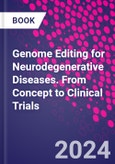Genome Editing for Neurodegenerative Diseases: From Concept to Clinical Trials examines recent advances in neurodegenerative disease research and clinical challenges in practical applications. With an emphasis on genome editing tools such as ZFNs, TALENSs and CRISPR-Cas, this book sheds light on the possibilities to counteract genetic and neurodegenerative diseases. It will be of interest to researchers in neuroscience and biopharmaceuticals, as well as clinicians specializing in neurodegenerative diseases.
Please Note: This is an On Demand product, delivery may take up to 11 working days after payment has been received.
Table of Contents
Introduction
Burkhard Poeggeler
1. Therapeutic potential of genome editing tools in neurodegenerative diseases
Ankur Kumar, Nandigam Pardhipa, Sachin G. Swami, Vibha Dwivedi and Anand K. Singh
2. Genetic and molecular basis of neurodegenerative diseases
Sunanda Yogi, Anjali Sangeeth, Anuradha Venkatakrishnan Chimata, Radhika Padma and Amit Singh
3. Genome editing tools: principles, structures, and mechanisms
Rayees Ahmad Naik, Mehak Naseer Mir, Roshni Rajpoot, Sonalika Singh, Kusum Singh and Sandeep Kumar Singh
4. Advances in CRISPER/Cas system and genome editing technologies for the treatment of neurodegenerative diseases
Shailendra Kumar Mishra, Hung-Ming Chang, Ahmad A. Obaid and Sandeep Kumar Singh
5. Use of CRISPR system in genetic screening to detect neurodegenerative disease
Koyel Kar
6. Epigenetic manipulation and gene regulation using the CRISPR/Cas system for neurodegenerative diseases
Josephine Esposto
7. Transgene delivery system: viral, nonviral, and other methods for central nervous system
Bhupender Sahu, Bibhudendu Behera and Umesh Kumar
8. Gene therapies for neurodegenerative disease: current knowledge and challenges
Bhumi Arora, Sakshi Garg, Aditya Shrivastav, Mrinalini Sharma, Bhupender Sahu and Umesh Kumar
9. Gene therapy under clinical trials for neurodegenerative diseases
Bhupender Sahu, Lakshita Tyagi, Prshant Tyagi and Umesh Kumar
10. Clinical challenges and future prospective in use of gene-editing tools as neurotherapeutics
Burkhard Poeggeler
Authors
Sandeep Kumar Singh Department of Medical Biotechnology, All India Institute of Medical Sciences, Nagpur, MH, India.Assistant Professor in Department of Medical Biotechnology at the All India Institute of Medical Sciences, Nagpur. He is researcher and neuroscientist with a strong background in Biochemistry and Biomedicine. His research interests are in neurodegenerative diseases and has ~12 years of experience. He's a member of editorial boards of several international journals related to neuroscience and member of several scientific societies. Dr. Singh has been appointed as Bentham Ambassador by Bentham Science Publisher (USA). He is a speaker at several scientific national and international conferences/symposium/workshops in India and abroad.
Amarish Kumar Yadav Dept. of Entomology and Plant Pathology, North Carolina State University, Raleigh, NC, USA. Dr. Amarish K Yadav is a postdoctoral research scholar at North Carolina State University. His current research interest is developing gene-drive systems using CRISPR/Cas9 in Drosophila suzukii. After obtaining his master's degree in biotechnology, he was awarded his Ph.D. from Banaras Hindu University in 2017. He has worked in collaboration with many neuroscientists and researchers to understand the molecular mechanisms of Alzheimer's and Parkinson's diseases progression and therapeutics. Dr. Yadav has published his research findings in peer-reviewed journals and has also authored a book chapter on neurodegenerative diseases modeling in drosophila. Dr. Yadav has participated and presented his research work at various national and international conferences and symposia. Burkhard Poeggeler Department of Biology and Psychology, Georg-August-University G�ttingen, Germany. Dr. Burkhard Poeggeler is affiliated with the Georg-August-University G�ttingen and works primarily on the biochemistry and pharmacology of regeneration by antioxidant protection and trophic prosurvival signaling. His research focusses on bioenergetic agents such as nitric oxide and on redox regulation such as neurovascular coupling. Together with many other distinguished scientists he investigates the unique nootropic, neurotrophic and neuroprotective activity of melatonin and related tryptophan metabolites based on their potent antioxidant, anti-inflammatory antiamyloidogenic effects such as amyloid clearance by the glymphatic system, the connective tissue, the interstitium and the gastrointestinal tract. Based on the exploration of these protective agents, he works on developing new possibilities to extend human health and life span. He is widely published with over 120 PubMed listed publications. George Perry Department of Biology, The University of Texas at San Antonio, University of Texas, San Antonio, TX, USA. Dr. George Perry, Ph.D. Professor of Biology and ChemistrySemmes Foundation Distinguished University Chair in Neurobiology
He is a neuroscientist known for his work on neuronal oxidation of nucleic acids in?Alzheimer's disease. He is distinguished as one of the top Alzheimer's disease researchers?with over 1000 publications, won numerous awards, and is one of the top 100 most-cited scientists.








